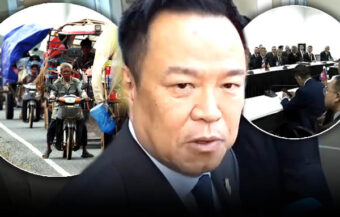PM Srettha points to political instability for a 16% stock market plunge. Analysts say Thailand’s faltering economy, declining manufacturing and lack of foreign investment are the real culprits. Finance Minister Pichai Chunhavajira unveils new plans to revive growth.
Thailand’s Minister of Finance, Pichai Chunhavajira, has laid out plans to tackle the country’s faltering economy and plummeting stock market. It comes as the Thai bourse has declined nearly 16% since this time last year, in contrast to other Southeast Asian exchanges, in particular Malaysia, which has risen 40% in the same timeframe. On Tuesday, Prime Minister Srettha Thavisin blamed the collapse on political instability caused by political-legal proceedings. However, most economic analysts see it as a direct response to an economy facing severe structural problems, including a declining manufacturing base and a lack of ability to generate foreign direct investment.

Thailand’s stock exchange, the Stock Exchange of Thailand (SET), is in crisis. On Monday, the index hit a new low of 1312.26. The index has fallen by over 4% in the mid-May to mid-June period alone and 6.9% for the year. Indeed, from this time last year, the index has lost 15.75% of its value.
Certainly, one of the most disturbing aspects of this is that it runs contrary to the regional trend in Southeast Asia. For instance, Malaysia’s Bursa Malaysia Stock Exchange has risen nearly 40% in the last year.
Decline in the value of Thai shares mirrors what happened on Chinese bourses but is in stark contrast to the rest of Southeast Asia where markets are rising
However, instead, it does mirror trends in China with the Shanghai Composite Index down 6.23% for the year.
On Tuesday, embattled Thai Prime Minister Srettha Thavisin told reporters that he believed the Thai market was driven down by negative sentiment. He referenced the legal troubles which are causing an acute sense of political instability this month.
The Prime Minister’s future and that of his government is on the line in a serious Constitutional Court review of his actions. In short, this is linked to his controversial appointment of Phichit Chuenban as Prime Minister’s Office Minister at the end of April in a cabinet reshuffle.
The appointment, which increasingly looks like a political blunder by the PM, led to a petition from caretaker senators to have the Prime Minister’s role reviewed. Mr Phichit resigned before the Constitutional Court agreed to take up the case.
The court voted, shockingly, 6-3 to do so. At the same time, Mr Srettha narrowly avoided being suspended in the interim by a 5-4 vote margin.
Appointment of Thaksin’s old lawyer jailed for corruption seen as a major blunder by the Prime Minister. Srettha’s removal would collapse the government
The proposed minister was a former lawyer who acted on behalf of Thaksin Shinawatra. In 2008, he was jailed along with associates for attempting to bribe Supreme Court officials.
Despite bringing former government legal eagle Wissanu Krea-ngam from the General Prayut era back as an advisor to work on the case, there is real concern about the Prime Minister’s future. His removal would collapse the current government and unleash political chaos.
At the same time, the country’s largest political party is before the Constitutional Court facing disbandment.
Political maelstrom may be unleashed in June with potential crises brewing and coming to a climax
PM survives Constitutional Court’s call in a close run thing raising real questions over his future
Lack of coherence in government policy is the root cause of Thailand’s massive economic problems
In addition, former Premier Thaksin Shinawatra will be indicted on June 18th on lèse-majesté and Computer Crime charges.
Thaksin faces the danger of being refused bail following his 2008 breach of bail conditions when he fled from Thailand.
Indictment of Thaksin on Lèse-majesté and Computer Crime charges seen as a breach of the secret backroom deal brokered ahead of his return in August 2023
The former government leader and de facto Pheu Thai Party leader has again submitted a petition for fair treatment to the Office of the Attorney-General (OAG) to halt the case.
In short, it is understood that the case came as a surprise to Thaksin when he landed in Thailand on August 22, 2023.
Therefore, it is considered a breach of the assumed backroom deal made by parties to the scheme which is the basis for the current government.
However, most analysts do not believe that political instability alone is driving the fall of the Stock Exchange of Thailand (SET).
In truth, Thailand’s economy is in a full-blown crisis. Its manufacturing base is disappearing with factory closures rising.
Thailand’s economy is in a crisis with an eroding manufacturing base which is failing to appeal to foreign export markets and is swamped at home by China
The extent of closures has raised fears about unemployment in the kingdom.
Indeed, this may become an issue over the next 6 to 12 months. This is unusual in Thailand where full employment is taken for granted. Previously, this was because of its casual sector, farming industry and past success in exports.
Factory closures rose to 1,700 in 2023 and are predicted to go higher.
According to the Ministry of Labour, this has, so far, left 500,000 people without jobs. In addition, up to 100,000 school leavers emerge into the employment market each year.
Some 43,000 are due to recent factory closures. KKP Research in Bangkok estimates that 150 factories a month closed in 2023. Only 50 per month were opened and with significantly lower levels of employment.
Presently, the automotive industry is being pulled asunder by issues over EV cars throughout the world.
In addition, a credit crunch by the Bank of Thailand is reigning in credit. Sales of pickup trucks in Thailand fell by nearly 43% in January and 34% for the first four months of the year.
Thailand’s economy has up to now mainly depended on exports. Indeed, it is 60% of GDP.
However, the ability of Thai firms to meet expectations abroad has been limited. This in turn has been caused by a lack of investment and failure to adapt to new technology.
At the same time, it is facing the dumping of products from China and cheaper Chinese imports at home.
GDP growth projections falling already with the latest from the Ministry of Finance set at 2.4% although the minster has unveiled plans to push for 3%
At the beginning of 2024, the International Monetary Fund (IMF) predicted that Thailand’s economy would grow by 4.4% in 2024. The latest Ministry of Finance projection is 2.4%, which assumes a 0.5% gain in exports. Last year, exports contracted by 1.7%.
In the midst of this crisis, Thailand’s new Minister of Finance Pichai Chunhavajira has signalled plans to tackle both issues.
In relation to the Stock Exchange of Thailand (SET), on Tuesday, he suggested a review of all sectors in the index. Significantly, he suggested that the market was behaving ‘inappropriately.’
In short, he said the government would analyse all sectors within the market and adjust its policies. At the same time, he would advance government plans to relaunch LTFs or Long-term Equity Funds.
Minister Pichai plans to tackle the stock market’s problems by resurrecting Long Term Equity Funds with tax incentives for small savers and investors
‘Stocks are related to trust and confidence. So we must deal with investors displaying inappropriate behaviours to allow newcomers to enter the market. The ministry will need some time to form a strategy,’ explained Mr Pichai.
75-year-old Mr Pichai was formerly the Stock Exchange of Thailand (SET) Chairman. This was before taking up his new role at the end of April.
On Tuesday, he explained his ministry’s plans to relaunch LTFs. These will include tax breaks that would bring back a savings habit, particularly among young people.
‘LTFs will definitely happen,’ he assured reporters. ‘We are working on selecting suitable funds as well as setting their amount and duration. This will generate most profits for both investors and the economy.’
Meanwhile, the new Minister of Finance has outlined a three-pronged plan to boost GDP.
Firstly, the finance minister wants to see an extra million tourists in 2024. He is targeting 36.7 million. Mr Pichai said this will add 0.12% to GDP.
Plans to tackle the disbursement of government funds and push it to 75% as well as getting a firm grip on Foreign Direct Investment data and money transferred
Secondly, he noted the need to increase the budget disbursement rate from 70% to 75%. However, it should be clear what the reason for the 70% limit is.
Comptroller-General Patricia Mongkhonvanit recently explained the disbursement issue is caused by local objections to project procurement decisions. In effect, projects and disbursements are being held up by legal wrangles.
Indeed, this has also been linked to corruption. For instance, those making such objections often agree to settlements or backhanders to withdraw the block.
Thirdly, Mr Pichai wants to boost FDI or foreign direct investment.
He is asking the Board of Investment (BOI) how much will be injected into the economy in 2024. Data on this has been notoriously conflicted with a wide variation of figures.
Conflicting figures for Foreign Direct Investment (FDI)
Mr Pichai is targeting between ฿300-฿400 billion this year. In short, $9.53 billion (฿350 billion).
Last year, the confirmed figure was $2.969 billion. This was in contrast to Indonesia at $21.7 billion, Malaysia at $18.6 billion and Vietnam at $8.255 billion.


















